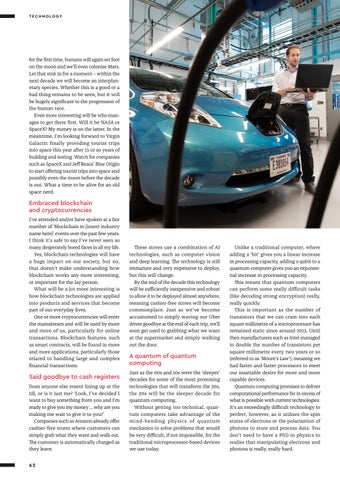TECHNOLOGY
for the first time, humans will again set foot on the moon and we’ll even colonise Mars. Let that sink in for a moment – within the next decade we will become an interplanetary species. Whether this is a good or a bad thing remains to be seen, but it will be hugely significant to the progression of the human race. Even more interesting will be who manages to get there first. Will it be NASA or SpaceX? My money is on the latter. In the meantime, I’m looking forward to Virgin Galactic finally providing tourist trips into space this year after 15 or so years of building and testing. Watch for companies such as SpaceX and Jeff Bezos’ Blue Origin to start offering tourist trips into space and possibly even the moon before the decade is out. What a time to be alive for an old space nerd.
Embraced blockchain and cryptocurrencies I’ve attended and/or have spoken at a fair number of ‘Blockchain in [insert industry name here]’ events over the past few years. I think it’s safe to say I’ve never seen so many desperately bored faces in all my life. Yes, blockchain technologies will have a huge impact on our society, but no, that doesn’t make understanding how blockchain works any more interesting, or important for the lay person. What will be a lot more interesting is how blockchain technologies are applied into products and services that become part of our everyday lives. One or more cryptocurrencies will enter the mainstream and will be used by more and more of us, particularly for online transactions. Blockchain features, such as smart contracts, will be found in more and more applications, particularly those related to handling large and complex financial transactions.
Said goodbye to cash registers Does anyone else resent lining up at the till, or is it just me? ‘Look, I’ve decided I want to buy something from you and I’m ready to give you my money ... why are you making me wait to give it to you?’ Companies such as Amazon already offer cashier-free stores where customers can simply grab what they want and walk out. The customer is automatically charged as they leave. 62
These stores use a combination of AI technologies, such as computer vision and deep learning. The technology is still immature and very expensive to deploy, but this will change. By the end of the decade this technology will be sufficiently inexpensive and robust to allow it to be deployed almost anywhere, meaning cashier-free stores will become commonplace. Just as we’ve become accustomed to simply waving our Uber driver goodbye at the end of each trip, we’ll soon get used to grabbing what we want at the supermarket and simply walking out the door.
A quantum of quantum computing Just as the 00s and 10s were the ‘sleeper’ decades for some of the most promising technologies that will transform the 20s, the 20s will be the sleeper decade for quantum computing. Without getting too technical, quantum computers take advantage of the mind-bending physics of quantum mechanics to solve problems that would be very difficult, if not impossible, for the traditional microprocessor-based devices we use today.
Unlike a traditional computer, where adding a ‘bit’ gives you a linear increase in processing capacity, adding a qubit to a quantum computer gives you an exponential increase in processing capacity. This means that quantum computers can perform some really difficult tasks (like decoding strong encryption) really, really quickly. This is important as the number of transistors that we can cram into each square millimetre of a microprocessor has remained static since around 2013. Until then manufacturers such as Intel managed to double the number of transistors per square millimetre every two years or so (referred to as ‘Moore’s Law’), meaning we had faster and faster processors to meet our insatiable desire for more and more capable devices. Quantum computing promises to deliver computational performance far in excess of what is possible with current technologies. It’s an exceedingly difficult technology to perfect, however, as it utilises the spin states of electrons or the polarisation of photons to store and process data. You don’t need to have a PhD in physics to realise that manipulating electrons and photons is really, really hard.
